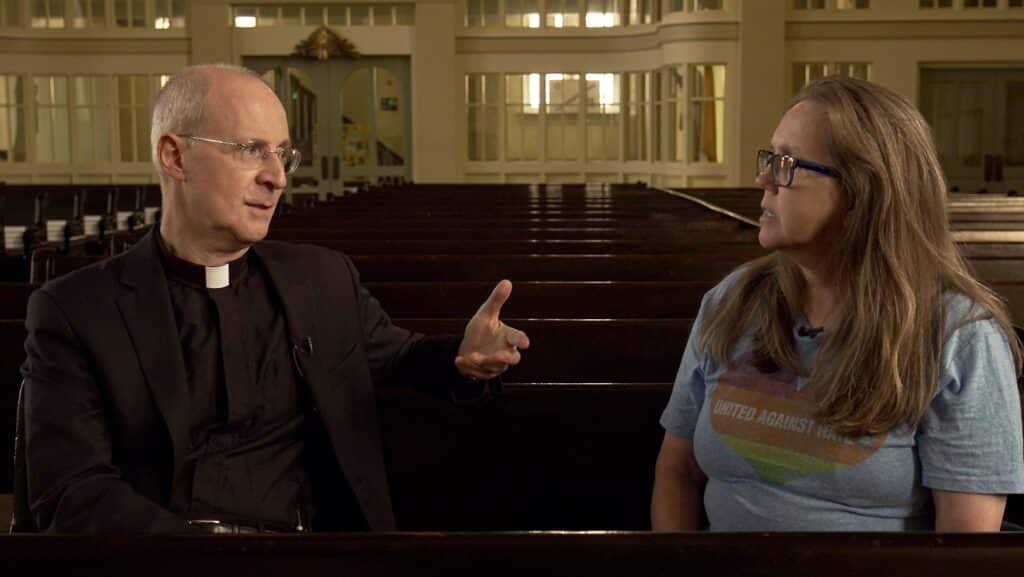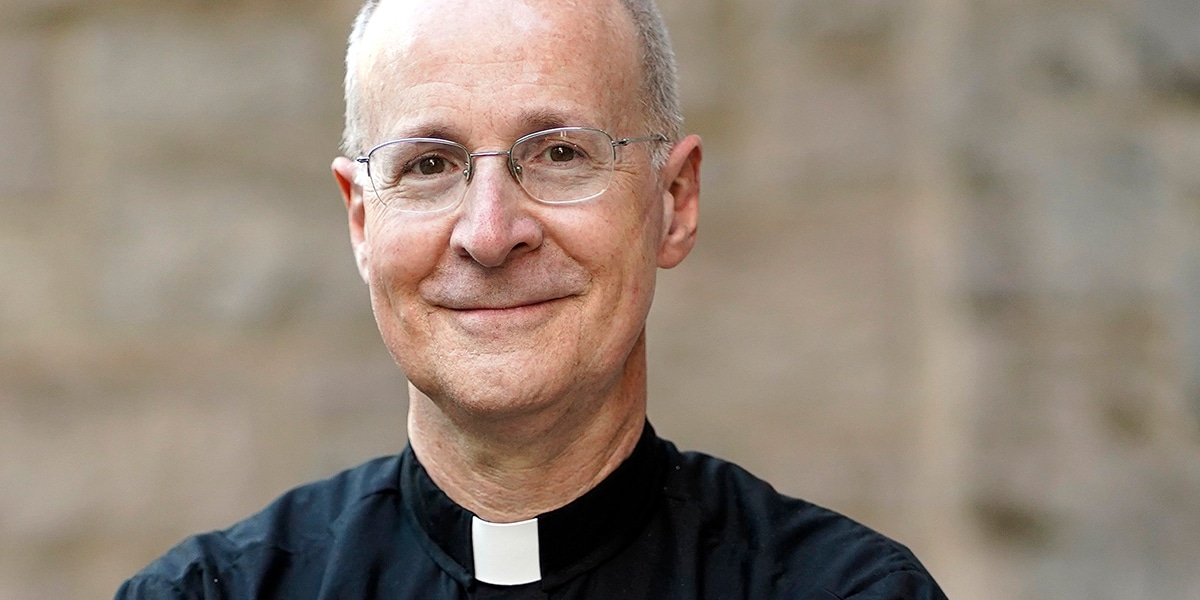Should the Church welcome LGBT members? “What would Jesus do?” asks this popular author and Jesuit priest.
Father James Martin, SJ, is a best-selling author of books about Catholic spirituality. In 2016, after a horrific massacre at a gay nightclub, the Pulse nightclub, in Orlando, Florida, he spoke out on the silence about the massacre on the part of Church leaders. A talk he later gave became the basis for his book Building a Bridge: How the Catholic Church and the LGBT Community Can Enter into a Relationship of Respect, Compassion, and Sensitivity (HarperOne). LGBT, of course, refers to lesbian, gay, bisexual, and transgender people. The book, published a few months ago, has garnered strong reaction, both supportive and negative. Father Martin is a consultant to the Vatican’s Secretariat for Communication.
I wonder if the negative reaction to your book was as much about how so many Catholics are conflicted about the whole LGBT issue. Some people think it’s contradictory to our faith.
I don’t quite understand how saying “LGBT Catholics” is contradictory. They’re baptized. They already are Catholics. It’s a question of whether or not the Church is willing to welcome these, our brothers and sisters.
Many people have family and friends, people whom they love, who are gay, as you know. Is it OK for those people to openly accept their gay family and friends?
Of course! It’s imperative for people to accept everyone as a beloved child of God! This is the way God made them. The people themselves are a gift to us. Particularly for young people, it’s essential that parents and grandparents and families accept them. The process of coming out or being open about your identity is extremely painful. I know people whose lives have really been destroyed by parents who have not been accepting. Yet this is what God asks us to do: to love one another. That’s the most basic of commandments.
It’s a hard thing to love someone you’re basically discarding, right?
Look in the Gospels and see who Jesus goes to first. It’s people who feel like they’re on the margins. So he’s continually reaching out to people like a Roman centurion, a tax collector, a prostitute, those who are sick, anyone who felt on the margins. There’s no one in our Church more marginalized today than the LGBT person, period. They really are, in many places, treated like lepers. I’ve heard the most appalling stories in the past couple of months since the book came out, from LGBT people and their families about how they’ve been treated. It’s really shocking.
For example?
A few months ago, a woman wrote to me through Facebook and said, “Do you know any compassionate priests in my city? Because I work at a hospice and there’s a man who’s dying here, whom the local priest refuses to anoint or see because he’s gay.”
Young Catholics
In your book, you talk a lot about encounter as a way through, a way to a new understanding. What do you mean by that?
In my way of looking at it, it’s friendship. It’s coming to know people, listening to them, sharing in their lives, entering into their struggles, and celebrating their joys with them. So it’s really just being friends. My book is a challenge to Church leaders. Can people who are in positions of authority be friends with LGBT Catholics?
Can they be friends?
Yes. Yes, and the question is, why not? LGBT Catholics are already part of the life of the Church. They are music ministers, directors of religious education, pastoral associates, and teachers in our schools. Our Church leaders, unbeknownst, are already friends with these people.
It seems as if there’s really a generation gap on this question, too. Young people don’t seem to be as conflicted as their parents. Do you have a feel for that?
I think that’s accurate. Straight, young Catholics have a problem with the way the Church treats LGBT people. It’s not the way that they treat their friends. They might ask, “Why would you treat my good friend, who is gay, like that? And why would I want to be part of a Church that treats my friends who are gay like that?”
Why are many younger people more tuned in to acceptance than their parents might be?
Because a generation ago, people were generally not out—public about their identity. Now you have people who are out. As more and more people come out, it becomes more and more something that everyone is familiar with. As straight people become friends with LGBT people, there’s a higher comfort level.
So, a lot of it does come down to personal relationships?
Absolutely. I think this is the genius of Pope Francis’ idea of a culture of encounter, a culture of encounter and accompaniment. The LGBT people become not simply categories, but friends. Certainly it changes the family, it changes everything. It’s one thing to be homophobic; it’s another thing to be homophobic when your son is gay or your daughter is lesbian.

Who Am I to Judge?
Q: Soon after Francis became our pope, people asked him about this issue and he asked, “Who am I to judge?” He’s not really endorsing the gay lifestyle, is he? What does he mean by that?
A: Well, it depends on what you mean by the gay lifestyle. What does that mean? Does it just mean living as a gay person? Does that mean engaging in same-sex relations? Does that mean getting married? The original question was about gay priests, and he said, “If a man is trying to find God, who am I to judge?” And then they pushed him and said, “Well, you meant just gay priests.” And he said, “No, everybody who’s gay.” By extension, he’s trying to move us away from this idea of judging LGBT people as sinners or as the worst sinners.
It’s quite discriminatory. You don’t have people being fired for living together before being married, for using birth control, for being divorced—you simply don’t. And yet it’s the LGBT person whose life, whose sexual morality is put under a microscope. It’s an instance of what the Catechism of the Catholic Church calls “unjust discrimination.”
It’s both true and relevant. Imagine, for example, a year ago at the Pulse nightclub. Imagine if a priest would get up and talk about what it was like growing up as a gay boy who was bullied. Just imagine that. How powerful that would be. That’s not to say a gay priest would talk about that kind of stuff all the time, but if you’re a priest who had been a refugee, you would talk about the stories of refugees from a personal standpoint. The Church is impoverished by having these people not able to be open about themselves.
Sometimes people call this moral relativism. It’s “anything goes; anybody has a right to believe and do as he or she pleases.” A lot of Catholics in the pews don’t want to be closed-minded but also don’t want to give in to the idea that anything goes. How do you view it?
First of all, why are these people assuming that these LGBT people are sexually active to begin with? Second of all, why are these people assuming that anyone else they deal with is not engaging in behavior contrary to Church teaching? And third of all, who are they to judge? Why don’t you get to know these people? And just accompany them as friends? It really is a very judgmental attitude, to approach a person as a problem or a sinner, instead of the way Jesus approached people, which is first as brothers and sisters.
The whole premise of questions like that from people, which I hear a lot, is that we must look at LGBT people solely through the lens of sex. We don’t treat any other person like that. Imagine seeing a group of college students—now most college students are sexually active—and asking, “Well, how can I possibly talk to this group of college kids? They’re all sinners.”
The Coin’s Other Side
Q: In your book, the building bridges idea implies a two-way effort. After all the things you just said, it almost seems ridiculous to ask, but when two sides need to come together, both parties have to do something, don’t they?
That’s, I think, the harder part of the book. I make it clear that the onus is on the institutional Church, because it’s the institutional Church that has marginalized the LGBT person, not vice versa. Nonetheless, LGBT Catholics are invited to treat their bishops and Church leaders with respect, compassion, and sensitivity. Those are just simply good Christian practices. But they’re also good strategy if you really want to enter into the dialogue.
I’m thinking of some LGBT folks who just have taken five steps away from the Church. How can I expect them to come closer?
A: Well, I think there are two reasons. One is, it’s simply the Christian call. It’s like asking, “How can you expect me to forgive?” Well, Jesus expects that, not me. Second of all, I think they can see that there’s change happening. Pope Francis’ five most famous words, “Who am I to judge?” really have changed things. He’s also talked about gay people he’s known. He met with a former student of his who’s gay, and his partner. He’s used the word gay. He talks about how Jesus would never say, “Go away from me; you’re homosexual.”
So it’s happening. I think there’s also a call for trust on the part of Catholics who feel estranged from the Church that they, too, are part of the Church and are called to contribute to its flourishing. They have a responsibility, too.
The book is pretty mild, and so I’m shocked at the response it’s gotten from both sides. It just shows why it’s important to talk about this issue.
Christmas Advice
The holidays are upon us. Do you have any pastoral advice for families who might be having awkward, or even heated, conversations?
First, love your LGBT son or daughter—or sibling, niece, nephew, grandchild. Love is the first thing. Second of all, make them feel welcome and not judged—the same way that you wouldn’t judge anyone else. Your family is filled with sinners because we’re all sinners. And third, listen to them, try to find out where they are, and what their hopes and dreams are. But love them—that’s the most important thing. As St. Augustine said, “Love and do what you will.”
What about from the other side of the bridge, from an LGBT person who has felt isolated or awkward with his or her family? What advice do you have for that person?
I would also say, try to understand them. Try to understand his or her limitations and where they’re coming from. Be open to change and pray for their own openness. But also remember: you have just as much a right to be in the family as anybody else does.


